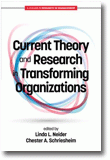
Current Theory and Research in Transforming Organizations
Edited by:
Chester A. Schriesheim, University of Miami
Linda L. Neider, University of Miami
A volume in the series: Research in Management. Editor(s): Timothy Ewest, Houston Baptist University.
Published 2016
Perhaps the best word to describe the past fifteen or so years of the twenty first century is “change.” Spurred on by the massive layoffs, and reorganizations that took place during the recessionary period starting in late 2007, to changes in labor demographics, technology, competitiveness, and the very nature of work, business transformations have become the norm. Even the most stodgy and inflexible organizations – universities – are beginning to understand the need for radical change if they hope to be sustainable in the future. From our perspective as researchers in management, we became increasingly interested in new trends and ideas in the field of transforming business and non‐profit enterprises. What are the variables associated with success? What determinants may mediate whether or not change efforts actually lead to more sustainable systems? And, how do such change efforts differ from strategic planning, which has obviously been around and used for many years? To begin answering such questions, this volume attempts to bring together a number of scholars who present conceptualizations and preliminary research insights concerning organizational change, and in two of the chapters, explore the relationship between change efforts and strategy formulation/implementation.
CONTENTS
Foreword: Current Theory and Research on Transforming Organizations. Feeling Positive, Negative, Ambivalent, or Apathetic: The Complexity of Emotional Responses Toward Major Organizational Change, Marie T. Dasborough and Heath R. Gregg. When Employees Are Powerless and Life Is Unfair: Effects on the Relationship of LMX to Change Commitment, Monica M. Sharif and Terri A. Scandura. Trustworthiness in Interorganizational Change Processes: Lessons from Selling Assets, Miriam Flickinger and Patricia Klarner. Integrating Strategy and Change Management Theory on Mergers and Acquisitions, Alannah E. Rafferty and Michael Shayne Gary. Strategy Implementation as a Dynamic Capability: Going Beyond the Organizational Change Interface, Angelina Zubac. The Use of the Cross‐Lagged Panel Correlation in Organizational Change and Development Research, Yuanmei (Elly) Qu. About the Contributors.
-
Paperback9781681236131
Web price: $45.04 (Reg. 52.99)
-
Hardcover9781681236148
Web price: $80.74 (Reg. 94.99)
- eBook9781681236155

- BUS085000 - BUSINESS & ECONOMICS: Organizational Behavior
- BUS103000 - BUSINESS & ECONOMICS: Organizational Development
- BUS020000 - BUSINESS & ECONOMICS: DEVELOPMENT: Business Development
-
 Advances in Authentic and Ethical Leadership
Advances in Authentic and Ethical Leadership
-
 Affect and Emotion
New Directions in Management Theory and Research
Affect and Emotion
New Directions in Management Theory and Research
-
 Perspectives on Justice and Trust in Organizations
Perspectives on Justice and Trust in Organizations
-
 Power and Influence in Organizations
Power and Influence in Organizations
-
 Research in Management International Perspectives
Research in Management International Perspectives
-
 The 'Dark' Side of Management
The 'Dark' Side of Management
-
 Understanding Teams
Understanding Teams

